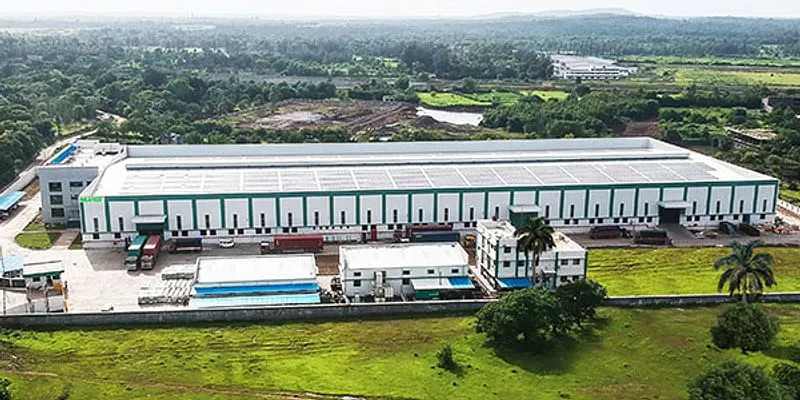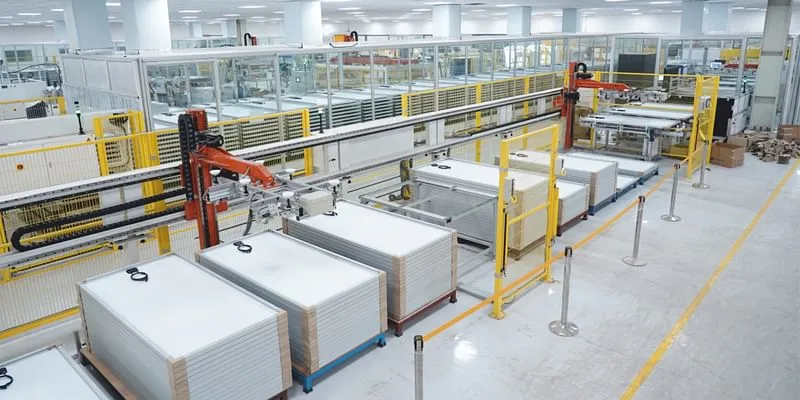This man built India’s largest solar business despite competition from China; is now clocking Rs 2,000 Cr revenue
In 1989, Hitesh Doshi started a thermal equipment trading business with Rs 5,000 in borrowed capital. Little did he know he was about to embark on a journey towards building India’s largest solar PV module manufacturing business - Waaree Energies - amidst tough competition from China.
When Hitesh Doshi started a thermal equipment trading business in Mumbai in 1989, he was simply looking to make ends meet and earn a living. Launching Mahavir Thermo Equip with a borrowed capital of Rs 5,000, Hitesh began trading temperature and pressure gauges.
In a journey spanning 30 plus years, a period that also witnessed the company pivot to solar, Hitesh transformed his business into Waaree Energies - a leading PV module and panel manufacturing firm with 2GW capacity - a number that is steadily growing.
In an exclusive interview with SMBStory, he says:
“According to the MNRE, we have the highest installed capacity of solar module manufacturers in India, followed by the likes of Adani, Vikram, etc. Last year, in a pandemic-hit market, we recorded Rs 2,000 crore turnover. Now, we are increasing our capacity to 5GW by December 2021, and hoping to triple our revenue.”
Hitesh and his company Waaree are playing in a market dominated by Chinese imports, and his story is one of championing local Indian manufacturing of solar PV modules and panels.
“A majority of modules are imported, and it has been difficult to compete with China. They have advantages in terms of economies of scale, government support, infrastructure, etc. Nevertheless, we have worked hard to foster relationships with clients who placed their trust in an Indian brand, and believed in the hands-on customer service we provided,” he explains.

Waaree's plant at Tumb in Gujarat
Early years of selling thermal equipment
Hitesh’s early days as an entrepreneur were all about facing and handling rejection. His young business, which went from trading to manufacturing temperature and pressure gauges, had no credibility in the market and found it difficult to land customers.
“Such products were used in boilers of industries, and nobody wanted to try a new product which could potentially lead to a high-risk incident or accident. If the gauges did not show accurate readings, it could lead to a boiler bursting and causing big losses in terms of human lives, capital, batches of chemicals and raw materials, property damage, etc,” he explains.
Market entry barriers such as long lists of approvals and certifications for the gauges added to the challenges.
It took over seven years for Hitesh to build credibility and efficiency in his manufacturing business and address the challenges. Strategic tie-ups with Dwyer Instruments (USA), Keller (Switzerland) and other international manufacturers helped, and so did a NABL (National Accreditation Board for Testing and Calibration Laboratories)-accredited testing lab.

Solar panels made by Waaree
Why solar?
By 2007, Hitesh’s business was exporting to the US and Canada, and seeing success in the thermal equipment market. However, he was still on the lookout for new business opportunities, and this is when he came across solar, which was still in its nascent stage in India.
“I had a hunger to grow the business further. During a trip to Germany, I went to a solar exhibition and was spell-bound. I talked to people there to understand how solar energy worked, and it convinced me that it would be the next step not only for expanding the business but also developing India’s solar manufacturing sector,” he says.
In 2007, Waaree Energies was born with a module manufacturing facility of 30MW in Surat. By 2010, Hitesh sold the thermal equipment company - Waaree Instruments - to the Swiss brand Baumer. The same year, he also expanded Waaree Energies’ module manufacturing facility to 250MW.
Business model explained
Since pivoting to solar, Waaree has not looked back. Despite working in a Chinese-dominated market, the business has steadily increased its capacity to 2GW.
‘With initiatives such as Make in India and Aatmanirbhar Bharat, we have boosted our local production of solar PV modules. The market is highly competitive, and as always, we have stayed abreast of other companies’ plans, government policies, emerging technologies in the space, and more,” Hitesh says.
He adds that although most raw materials are available in India, suppliers cannot meet Waaree’s scale of requirements.
“For instance, we require a lot of glass and in India, we have only one company - Borosil - which makes the glass we need. Borosil also supplies to other solar brands, and we mostly only get about 25 percent of our requirements from them. Thus, we are forced to import the rest.”
Once manufactured, the solar PV modules and panels are sold to customers such as schools, colleges, hospitals, or others that want to install rooftop solar, as well as enterprises that want to set up solar plants and parks, and sell the electricity to state-run electricity boards.
“At a solar park, 1MW equals around 3,500 panels. We have installed 4GW so far at solar parks, which amounts to around 14 million panels,” Hitesh explains.
He adds that while it doesn’t directly sell to B2C customers, Waaree has set up a network of over 350 franchised outlets that deal with end-consumer requirements of rooftop solar for homes.
“Our customers feel more comfortable dealing with an Indian company with Indian owners. For B2B clients, it can be difficult to deal with Chinese companies who may not understand English or know their requirements. Due to price fluctuations of raw materials, some Chinese brands may negotiate or not honour their contracts. All these factors give customers more confidence in Waaree,” Hitesh says.

Inside Waaree's plant at Tumb
COVID-19 impact and future plans
Manufacturing and installation in the solar industry can be labour intensive. As Waaree found out last year, workers returning to their hometowns on account of the COVID-19 pandemic can lead to disruption of business.
But not one to let time go waste, during the period of lull, Hitesh pushed exports in the US market and identified new supply channels.
“Solar panels and plants can in fact be installed quicker than traditional, non-renewable plants. However, a large number of our workers went home. Even if we did manufacture panels, we didn’t have the workforce to install them. Last year was our lowest installation year," he says, adding:
"As the workforce is yet to return in full after the second wave, we spent time focussing on new suppliers and new technologies. This year, we will again see around Rs 2,000 crore turnover, or perhaps grow just by 15 percent."
As the Indian government aims to achieve 114 GW of solar capacity by 2022, and the solar sector makes a comeback, Waaree plans to not only increase its total capacity to 5GW and triple its revenues, but also increase its focus on manufacturing solar cells, lithium batteries, solar-enabled agriculture pumps, inverters, and more.
Edited by Anju Narayanan









